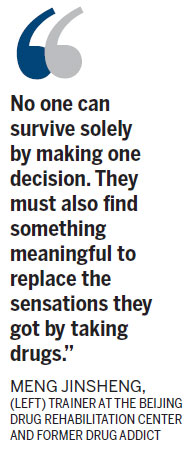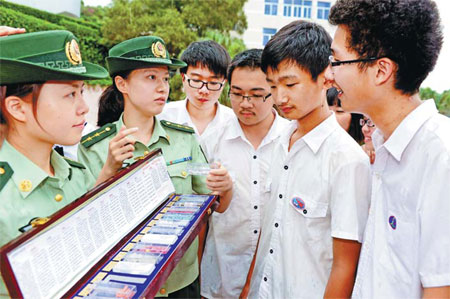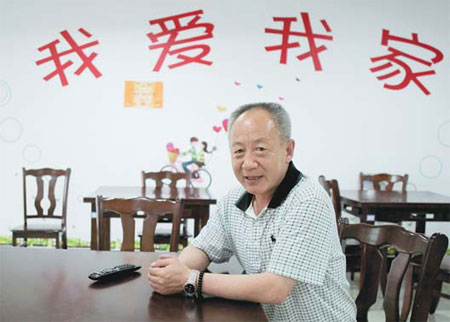Recovery gives youth new chance at lifeSA
Updated: 2013-06-24 07:14
By Zhang Yuchen and Wang Shanshan (China Daily)
|
||||||||
|
A drug dog displays its skills in Guangzhou, Guangdong province, on Sunday as part of a demonstration by China customs. Mao Siqian / Xinhua |
|
Hu Xiaojia, 21, on the last day of his three-month stay in Beijing Drug Rehabilitation Center. He began to use drugs at age 14. Wang Jing / China Daily |
|
Police officers in Fuqing city, Fujian province, tell middle school students how to identify different drugs. The lesson was part of a campaign to raise awareness of drug abuse among young people. Zhang Guojun / Xinhua |
|
Wang Jing / China Daily |

Drug use a rising issue among the young, report Zhang Yuchen and Wang Shanshan in Beijing.
Although it was the last day of his three-month recovery program at a drug rehabilitation center, Hu Xiaojia didn't expect a farewell party. He knew no one would be waiting to greet him on the outside and help him reintegrate into society.
Sitting at a square table, still drowsy from his noon nap, Hu is one of the 1,000 voluntary recovering addicts at the center.
"I waited all morning for you to arrive, preparing a complete version of my story, but I fell asleep because you turned up later than I expected and it was noon," he said, looking like a naughty teenager smiling in the sunshine.
At 21, he is the youngest patient at the Beijing Drug Rehabilitation Center, and he doesn't feel like looking back at his "bloody and tearful" teenage years. In fact, he'd rather forget about his past life entirely.
The problem started at a heroin party with friends at a dance hall in Shanxi province when he was 14, but perhaps his addiction could have been foreseen. When he was young, Hu's parents separated and married new partners, both of whom were strangers to him.
"Why did I begin to use the drug? Well, my parents said I was a bad child," he said. His voice became toneless and his smile was replaced with a slightly resentful and cold look. "I believed their comments, which, as I have recently realized, triggered my low self-esteem."
Addicts before adulthood
The youngest drug users in China - excluding those born into the families of drug dealers' along the boundaries of Yunnan province, which forms one side of the Golden Triangle, one of Asian's main opium-producing areas - are just 10 years old, according to statistics provided by Yao Jianlong, assistant professor of the Criminal Justice School at East China University of Political Science and Law. Many are addicted before they even reach adulthood.
Living alternately one week with his mother's new family and the other with his father's, and with plenty of money at his disposal - too much money for a boy with no real parental guidance - Hu's story is similar to those of other addicts. The same spiral of drug abuse dominates; at the beginning they use drugs for fun or to win approval from their peers. At first, they use drugs once every two or three months, but the frequency rises to once a month, then once a week. Finally, when the situation escalates and gets out of control, they use drugs every day.
Hu can't clearly remember how his "friends idling in the street" persuaded him to take the first hit of heroin, but he is adamant that he would never encourage friends or classmates to use drugs.
Eventually a friend informed on him and Hu was arrested. Before that, he'd managed to hide his new "hobby" from his parents, and even the increasingly large amounts of money he requested did not alert them to the situation.
The cycle of arrest and release at local police stations became routine, and although he continued to use a number of drugs, mostly heroin, he never took crystal meth, a highly addictive derivative of amphetamine, which is popular with younger drug users.

"The situation is becoming worse in that an increasing number of young users have started taking new types of drugs," said Sun Benliang, director of the Beijing rehabilitation center. "More young people are becoming addicted".
Last year, about a dozen 14-year-old middle school students were found to be using various narcotics in the Miyun district of Beijing.
Drug use is rising in China; the country had 1.79 million registered addicts at the end of 2011, according to the United Nation's Office on Drugs and Crime. In 1990, the number was 70,000. Moreover, the actual number of addicts is believed to be much higher than the official figures suggest, with some estimates putting the number at more than 12 million.
Never use 'ice'
One incident shocked Hu to his core and made him reassess his priorities. At a bachelor party, he saw how the groom-to-be began to hallucinate after taking "ice", as crystal meth is sometimes known. Believing he was being chased by the police, the young man jumped from a seventh-story window and died, just one day before his wedding.
Hu said he will never forget the terrified look on the man's face as he ran through the room. At that point, he made a decision - never use "ice".
Although, it's unlikely to be the last tough decision Hu will have to make in connection with drugs, it was a wise one. In 2011, 65 percent of Chinese addicts were heroin users, a decline of 13 percent since 2008. By contrast, users of methamphetamine, the official name for crystal meth, accounted for 23 percent of addicts, up from 9 percent in 2008, according to the UN.
A few years ago, Hu's mother was diagnosed with a brain tumor that almost sent her blind. His mother's illness shocked Hu, so he decided to tell her the truth about his addiction and attempted to stop using drugs.
However, his mother seemed not to understand the damage heroin was doing to her son, until one day she discovered him crawling on the ground, face down. Without drugs, Hu was going through "cold turkey", the aches and pains, burning fevers and icy coldness that accompany total heroin withdrawal.
But it wasn't his mother's tears that prompted him to quit, so much as her subsequent actions. She gave him 100 yuan and said, "Don't torture yourself like that. If you're suffering that much, go and take some drugs to feel better."
Hu took the money, but instead of buying heroin, he bought methadone, a prescription substitute. He had made his decision. However, he didn't realize how hard quitting would be.
He tried to quit twice before he finally decided to admit himself for the three-month course. The first time he tried quitting, around a year ago, Hu only stayed at the center for one day. He couldn't stand the idea of seven days of compulsory treatment and without his loved ones around he found it hard to carry on.
Back home, he again took drugs, but after much thought, decided to make another attempt to quit. The second attempt lasted longer, a month, but he relapsed.
"It is rare that addicts completely stop taking narcotics," said Yao Jianlong, assistant professor of the Criminal Justice School at East China University of Political Science and Law. "Just like smoking, taking drugs is a lifelong 'habit' or, more accurately, a compulsion. The damage, both financial and physical, is obvious."
'Students' rules'
During his three months at the center, Hu led a peaceful life, discussing his problem with the psychiatrists and reflecting on his turbulent seven years.
"As time passes, I realize how I lived my life the wrong way and gradually I came round to forgiving my parents, I realized it wasn't their fault. But I still hate those gangster friends who seduced me into using dope."
Zhao Min, vice-president of Shanghai Mental Health Center , said: "The problems of dealing with opiate addiction are all psychological. Unless the damage caused by drugs has already affected the nervous system, all drug addicts should undergo psychological therapy."
Every afternoon, the center's patients are required to recite the Di Zi Gui, or "students' rules", in classical Chinese. The text, written by Li Yuxiu, a famous scholar and educator during the Qing Dynasty (1644-1911), aims to teach people "how to become moral human beings".
When he sat quietly, Hu sometimes had a twitch in his temple and he lowered his eyes when bad memories returned. But he became animated when he spoke of the things he has learned at the center. "Now I know how to clean the floor," he said with a proud smile. "I know that's normal for most people, but I never did it before I came to the center."
He said he still dreams of achieving something meaningful. "Maybe I can learn some computer skills at a university, like some of my high school classmates," he said.
The future, however, may not be as bright as he hopes. The international relapse rate among drug addicts is around 95 percent, meaning very few quit completely.
"No one can survive solely by making one decision," said Meng Jinsheng, a 53-year-old volunteer trainer in the center, who was a drug user a decade ago. "They must also find something meaningful to replace the sensations they got by taking drugs."
Hu said the first thing he wanted to do when he left the center was to go home and see his mother, who is still in the hospital.
"I have more confidence now," he said, smiling.
Contact the writer at zhangyuchen@chinadaily.com.cn
(China Daily USA 06/24/2013 page8)
Most Viewed
Editor's Picks

|

|

|

|

|

|
Today's Top News
China shares deepen downward spiral
Snowden exposes more US hacking, then flies
Xi vows bigger stride in space exploration
Mandela's condition critical
Suspect in shooting spree detained
Mountaineers killed in Pakistan
Foreign firms eye new 'opening-up'
Project halted due to bird nests
US Weekly

|

|



















